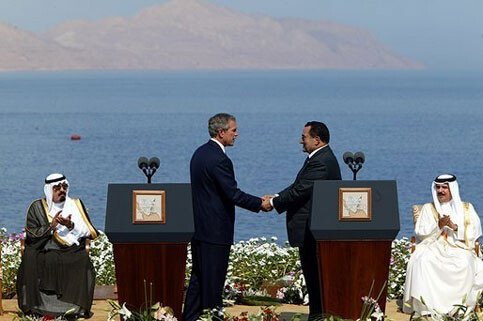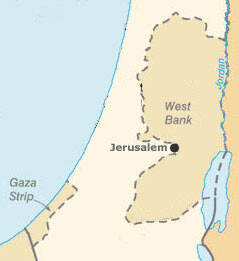The Electronic Intifada 4 June 2003

Above: President George W. Bush and President Hosni Mubarak of Egypt after delivering statements on the progress of the Red Sea Summit in Sharm El Sheikh, Egypt June 3, 2003. On the far left sits Prince Abdullah Bin Abd Al Aziz of Saudi Arabia and on the far right sits King Hamad Bin Issa Al Khalifa of Bahrain. (White House/Paul Morse)
With the twin summits in Sharm Al Sheikh and Aqaba underway, many believe that the likelihood of a major breakthrough in the efforts to break the cycle of Israeli-Palestinian violence and resuming serious talks towards a settlement are realistic.
While most are not oblivious to the usual Israeli manoeuvres, procrastination and obstructions, which killed many similar previous attempts, they, this time, count on the commitment of President George Bush to pursue his promise of settling this historic conflict along the lines of his declared two-state vision, once and for all. Bush, they argue, cannot afford to allow any failure on this front to erode his credibility any further, particularly at this very critical juncture in his political life. Neither would he go as far as holding all those summits, and reiterating his unwavering resolve, if there were the slightest risk of any devastating anti-climax.
With so much unfinished business in Afghanistan, in the war of terror, which is reemerging full force and hitting quite hard, and with desperate struggling to justify both the cause and the effect of the war on Iraq, with daily loss of American life and face, Bush will not allow Israeli Premier Ariel Sharon to deprive him of a victory he needs and is bent on achieving, the optimistic view ardently reasons.
I fully support this line of thinking. I also believe that Sharon would not have presented the roadmap to his Cabinet (though the resulting approval was damagingly restricted and conditional) had it not been for intense and direct American pressure on him to do that. Yet, and while I fully share what apparently looks as sound reasoning, I do not, however, share any optimism as to the final outcome of this effort, as I strongly believe, for reasons which will follow, that it is just a matter of time before the whole scheme falls apart right in front of everybody’s wide open eyes.
First, there are many contradictions and vagueness in the plan which enables each party to make its own convenient deductions and, due mainly to the absence of any agreement on a common goal, the convenient target becomes to avoid rather than reach agreement. The sloppy and loose nature of the roadmap, allowing so many divergent and incompatible interpretations, would end up landing each party in separate and disconnected destinations, far apart and further from their starting point. The additional factor is a total absence of a common language for inter-party communication, and the implied disagreement on the meaning of every term. If this is supposed to be the facilitating “constructive ambiguity”, it is time to realise that it led to adverse results in the past, and overdosing on it now will only make the situation worse.
The key tools for any meaningful communication, words and phrases such as “roadmap,” “withdrawal,” “ending the occupation,” “redeployment,” “Palestinian state,” “illegal settlements,” “viable,” “sovereign,” “terrorist activity,” “resistance,” “right of return,” “just solution of the refugee problem,” “security needs” and “security concerns,” “borders,” “secure borders,” “242”, change meaning and connotation all the time, depending on the side using them and on the purpose. For over 35 years already there has been no agreement on the meaning of any of these terms which we use constantly not only in our political regurgitation but also in our official negotiations. Even “Jerusalem” and “the West Bank” refer these days to totally different entities, depending on the intention of the user.

Above: The Gaza Strip and West Bank (which includes Jerusalem) represent just 22% of the historic Palestinian homeland. Every day, Israel works to consolidate its hold on Palestinian land through defacto annexation by the Apartheid wall, the razing of homes and agricultural land, and new Israeli settlements. This process of colonisation is the source of the Israeli-Palestinian conflict. Any “solution” that does not address and reverse this process is doomed. (EI)
For Israel, on the other hand, that means something totally different. Not only did the Israeli reservations on the roadmap, which the US committed itself to address “fully and seriously”, empty the roadmap of its meaning, but Sharon is firmly opposed to any final settlement with the Palestinians before the Zionist expansionist programme over the entire West Bank and Gaza is completed.
As a temporary arrangement, and due to the fact that the Arab Palestinian presence there would obstruct outright annexation, Sharon plans to confine the Palestinians to three disconnected cantons, covering, on the West Bank, no more than 42 per cent of the entire area. He will not object if the Palestinians chose to call it a state or a provisional state, as stipulated by the roadmap, but it will be surrounded by the occupation and will have none of the characteristics of independence or real sovereignty; “an autonomy, in effect, but occupation in practice”, as Palestinian Minister of Labour Ghassan Al Khatib described it.
This is Sharon’s and the Israeli government’s view of the widely advertised Palestinian state and of ending the occupation — ending the occupation of the people and not of the land and resources. (Al Ahram Weekly, Graham Usher, 29 May 2003)
On other final status issues, the Israeli views are hardly any better: rejecting a freeze on settlement activity and only offering to remove “illegal outposts”, on the question of settlements; insisting that Jerusalem should remain the united eternal capital of Israel on the issue of Jerusalem; and denying any discussion of the Palestinian refugees’ right of return, on the issue of the refugees.
Neither the Arab (Saudi) initiative of the Beirut Summit, nor the UN relevant resolutions would tolerate such extreme Israeli positions. And although the Palestinian Authority and Mahmoud Abbas’ government may be willing to stand by their previous compromises on these issues, they will be unable to go that far, or even further, in surrendering inalienable Palestinian rights, knowing well that their people will fiercely reject it and rebel against it.
The majority of the Arab people will reject it too. Hence, a series of terrible miscalculations. One is the expectation that Sharon would, under any circumstances or any amount of American pressure, agree to meet the minimum requirements for the implementation of the original roadmap. The second is the expectation that President George Bush will be able to force Sharon to offer more than the empty gestures of plan B (granting more work permits to Palestinian workers, releasing a batch of Palestinian prisoners, releasing some of the Palestinian tax money held in Israel and redeploying Israeli forces from agreed-upon sectors of Gaza to test Abu Mazen’s ability to keep the peace, The Guardian, March 28), which are often promised but not fulfilled, or to cross the red lines behind which he had already entrenched his position. Third is the assumption that even if all the obstacles are finally overcome and even if the Palestinian government is ready to sign the envisaged humiliating agreement, along the lines of the previous offers of Barak and Clinton, excluding Jerusalem, reducing the territory, keeping the settlements, truncating the state, and squandering the rights of the refugees, there will be peace.
The bitter reality is that the gap between the Israeli and the Palestinian positions remains so wide that no amount of American pressure will be enough to bridge. It is a distance that the Israelis have to cross alone, because the Palestinians have stretched their position already to a very dangerous limit. They cannot move any further. Most likely, when American pressure on Sharon falters, with the gap still wide open, Bush will, as habitual, turn on to the Palestinians to cover the remaining space, and that will be a dead end.
The writer is former ambassador of Jordan to the UN. He contributes regularly to EI.





